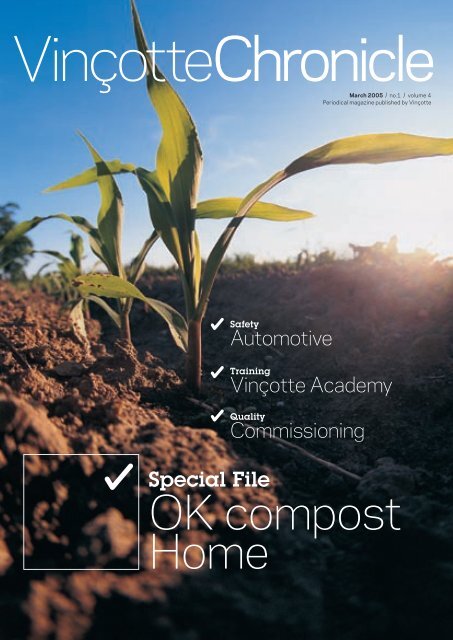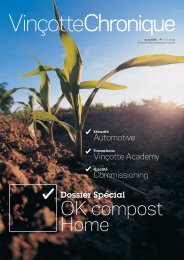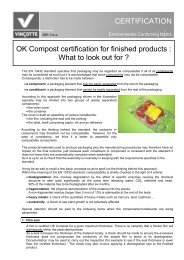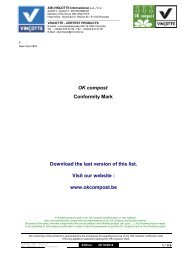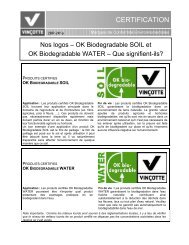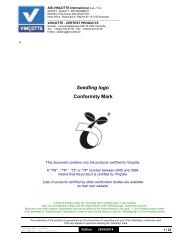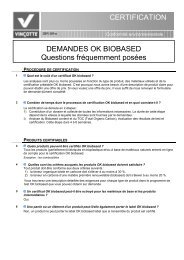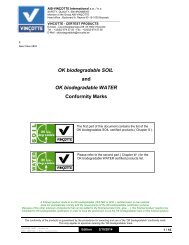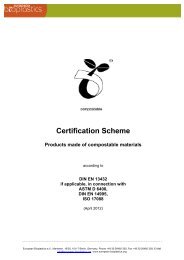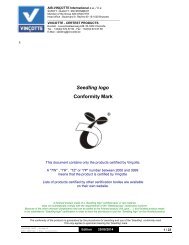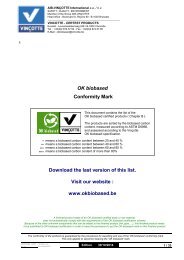vincotte kroniek GB.indd - OK compost
vincotte kroniek GB.indd - OK compost
vincotte kroniek GB.indd - OK compost
Create successful ePaper yourself
Turn your PDF publications into a flip-book with our unique Google optimized e-Paper software.
VinçotteChronicle<br />
March 2005 / no.1 / volume 4<br />
Periodical magazine published by Vinçotte<br />
Safety<br />
Automotive<br />
Training<br />
Vinçotte Academy<br />
Quality<br />
Commissioning<br />
Special File<br />
<strong>OK</strong> <strong>compost</strong><br />
Home
6<br />
Green light for<br />
<strong>OK</strong> <strong>compost</strong> Home<br />
First <strong>OK</strong> <strong>compost</strong> Home certification for<br />
total packaging issued to Carrefour Belgium<br />
If this introduction appears to be a simple, logical matter, let us admit to you right away that<br />
things proceed less logically in real life. ‘Laws and practical difficulties stand between the<br />
dream and the deed’ – the oft-quoted line by Willem Elsschot is seldom as appropriate as<br />
it is in this case. So there is plenty of material for an ecological round table discussion with<br />
Philippe Dewolfs and Serge Van Gestel of Vinçotte, Guido Brosius and Griet Leynaert of<br />
Carrefour Belgium and Jan van Heule of Innovia.
VinçotteChronicle<br />
7<br />
“Of course it’s not purely and simply a<br />
question of packaging; in my view it’s more<br />
a question of packaging the message.<br />
More precisely, the sorting message.”<br />
Guido Brosius, Sr Packaging Manager, Carrefour Belgium
8<br />
Special File <strong>OK</strong> <strong>compost</strong> Home<br />
The background:<br />
10 years of pioneering<br />
Exactly 10 years ago, Vinçotte launched<br />
the innovative concept of <strong>OK</strong> <strong>compost</strong> –<br />
a conformity mark guaranteeing that the<br />
certified products meet the harmonised<br />
European standard EN 13432 2000<br />
(the current version), and can therefore<br />
be <strong>compost</strong>ed in an industrial<br />
<strong>compost</strong>ing plant. The mark was initially<br />
intended for kitchen and garden waste<br />
collection bags, but its use gradually<br />
found its way into the packaging market.<br />
In Belgium, the retailer Carrefour<br />
Belgium is way out in front of the field<br />
in this respect. In 2003, after two<br />
years of research, the distribution chain<br />
launched a fully <strong>compost</strong>able packaging<br />
with the <strong>OK</strong> <strong>compost</strong> mark for organic<br />
fruit and vegetables. A further step<br />
in the right direction is being taken<br />
in 2005. Based on the principle that<br />
the best packaging is packaging that<br />
doesn’t have to go into the household<br />
waste collection, <strong>OK</strong> <strong>compost</strong> Home is<br />
being introduced – the first packaging<br />
to be 100% <strong>compost</strong>able at home<br />
in consumers’ own gardens. A world<br />
first for Vinçotte and an exclusive for<br />
Carrefour Belgium, which will have<br />
organic fruit and vegetables in <strong>OK</strong><br />
<strong>compost</strong> Home packaging on the shelves<br />
of all its Carrefour hypermarkets and <strong>GB</strong><br />
supermarkets from mid-April. Basically<br />
this means that you’ll now throw the<br />
packaging onto your <strong>compost</strong> heap<br />
along with the peel and other fruit and<br />
vegetable waste.<br />
“A good buy in<br />
the supermarket, and an<br />
even better buy now that<br />
you can home <strong>compost</strong>.”<br />
The trend<br />
More and more producers are launching<br />
new, environmentally friendly packaging,<br />
from <strong>compost</strong>able deep-freeze trays<br />
to biodegradable flowerpots and<br />
<strong>compost</strong>able magazine wrappers. The<br />
movement towards such products is<br />
particularly positive for instance as<br />
an alternative to packaging materials<br />
that can only be disposed of as nonrecyclable<br />
waste, and therefore by<br />
incineration. The bioplastics are derived<br />
from organic material such as wood pulp,<br />
corn or wheat – all natural, renewable<br />
resources that are also very interesting<br />
for cutting back on CO 2 emissions. .<br />
Jan van Heule: “As the manufacturer of<br />
the NatureFlex packing films, Innovia is<br />
very familiar with the market for organic<br />
products. Today’s worldwide market<br />
is estimated at well above $20 billion.<br />
We’re talking about over €130 million<br />
for our European fruit and vegetable<br />
market alone. As well as catching the<br />
imagination, thefarumzse figures<br />
clearly show that both governments<br />
and industry feel the need to bring in<br />
renewable sources. Supermarkets in<br />
particular are trying to gain advantage<br />
from this major market opportunity.”<br />
Griet Leynaert: ”That’s part of it, but<br />
I’d also like to add that this opportunity<br />
is also being driven by our customers.<br />
The aware consumer feels better<br />
about buying biodegradable packaging<br />
than non-recyclable packaging. And<br />
consumers today are more ecologically<br />
aware in their shopping. They look for<br />
the ‘green’ labels that are shown on the<br />
products.”<br />
Guido Brosius: “As a supermarket, we’re<br />
constantly watching the quality of the<br />
products we offer, but we watch the<br />
quality of our packaging too. Product<br />
packaging has always been a difficult<br />
issue for distribution sector businesses<br />
to deal with. Every consumer is faced<br />
with packaging waste at home, so it’s<br />
logical for us to look for solutions to<br />
reduce the amount of post-consumption<br />
waste. And there’s an additional<br />
argument: we can remove products<br />
that have passed their sell-by date in a
VinçotteChronicle<br />
9<br />
single operation. So we no longer have<br />
to unpack them to process the waste<br />
separately. Just count up what that<br />
saves in time and labour.”<br />
The potential<br />
Just ten years ago, consumers were still<br />
very suspicious of this kind of packaging.<br />
Either the bioplastics didn’t break down<br />
properly, or they were of a technically<br />
inferior quality. In addition, there was<br />
no legal framework and the terms<br />
degradability and <strong>compost</strong>ability were<br />
too vague. We have now progressed<br />
beyond that stage, after many years<br />
of product research, to create more<br />
clarity, a better price level and everincreasing<br />
availability. But one thing<br />
is still quite clear: the success of<br />
bioplastics for consumer products will<br />
depend primarily on the waste collection<br />
options, on collection practice and on<br />
the management of any obstacles to the<br />
<strong>compost</strong>ing process.<br />
Philippe Dewolfs: “It’s certainly the<br />
case that launching products of this kind<br />
is not a straightforward matter. There<br />
are perhaps still too many issues. Let<br />
me just mention the higher cost of the<br />
basic material –<strong>compost</strong>able packaging<br />
can cost up to five times as much– the<br />
higher FOST Plus contribution that still<br />
applies, difficulties in the pre-sorted<br />
collection and processing, and confusion<br />
for consumers due to the absence of<br />
the right sorting method and too many<br />
different logos.”<br />
“Environmentally aware consumers<br />
feel better about buying a product<br />
with degradable packaging than<br />
one with non-recyclable packaging.<br />
Clear information with labels and<br />
pictogrammes is essential.”<br />
Griet Leynaert, Quality Service & Environment<br />
Program Coordinator, Carrefour Belgium<br />
Guido Brosius: “The FOST Plus tariff<br />
settings will certainly have to change<br />
for the better in due course. According<br />
to FOST Plus, biodegradable material<br />
still belongs in the ‘Other’ category<br />
at the moment, and that also is the<br />
most expensive category. Putting<br />
<strong>compost</strong>able materials in the paper and<br />
cardboard tariff category would be a<br />
first step in the right direction. Look<br />
at the German example, where these<br />
materials are initially exempted from<br />
contribution, with an appraisal to follow.”<br />
Griet Leynaert: “To some extent,<br />
Vinçotte’s development of <strong>OK</strong> <strong>compost</strong><br />
Home has been created as another<br />
disposal solution, because that’s just<br />
where the bottleneck is – with the<br />
collection facilities. On the<br />
one hand, OVAM is asking<br />
the industry to make efforts<br />
to be ecological – as we<br />
have been able to do with <strong>OK</strong><br />
<strong>compost</strong>, thanks to<br />
Vinçotte – but on the other<br />
hand, when we then launch<br />
the product it turns out that<br />
the existing processing<br />
plants still have to be<br />
modified. With the result that<br />
bioplastics can’t be included<br />
with the kitchen and garden<br />
waste collection, but have<br />
to be placed with the other<br />
waste.”<br />
Jan van Heule: “But the fact that<br />
you’re not allowed to put bioplastics<br />
in the bags or bins for kitchen and<br />
garden waste need not be a problem<br />
for ecologically aware consumers.<br />
Compostable and degradable packaging<br />
is more environmentally friendly than<br />
ordinary packaging. At the moment, a<br />
solution still has to be found for the best<br />
processing method, but packaging with<br />
the <strong>OK</strong> <strong>compost</strong> Home mark can<br />
already be <strong>compost</strong>ed at home without<br />
any problem.”<br />
>
10<br />
Special File <strong>OK</strong> <strong>compost</strong> Home<br />
Serge Van Gestel: “It’s true that our<br />
Flemish plants are not yet suitable.<br />
Most plants provide a sieving process<br />
as pre-treatment for the waste, with<br />
the result that both ‘<strong>compost</strong>able’ and<br />
‘ordinary’ packaging is sieved off and<br />
can’t be <strong>compost</strong>ed. There is the fear<br />
that the residual percentage sent for<br />
incineration will increase substantially,<br />
and that could raise costs for the kitchen<br />
and garden waste processor. Don’t<br />
forget that we’ve been arguing for a<br />
clean inflow of kitchen and garden waste<br />
in Flanders for years now. Flanders is the<br />
biggest <strong>compost</strong>er in Europe, and in fact<br />
Flemish kitchen and garden waste is the<br />
cleanest in the EU, with a pollution rate<br />
of only 1.5% by weight at most.”<br />
“What pleases me too is the excellent<br />
synergy between all the companies<br />
involved – a real multi-sector cooperation<br />
in which ten partners focused only on<br />
their own interests but also on the<br />
interests of the environment.”<br />
Jan van Heule, Sales Manager Benelux & France, Innovia<br />
Griet Leynaert: “Of course, there’s<br />
also the ‘contamination factor’ – the<br />
risk that non-<strong>compost</strong>able packaging<br />
or material will sometimes end up in the<br />
kitchen and garden waste as well as<br />
the <strong>compost</strong>able packaging. In other<br />
words, VLACO and OVAM assume that<br />
consumers won’t distinguish between<br />
ordinary plastic and bioplastic, they’ll<br />
just dump everything in the same<br />
kitchen and garden waste bin.”<br />
Philippe Dewolfs: “If I can put the other<br />
side of the argument just as strongly,<br />
I would say that people who don’t<br />
distinguish are deliberately refusing<br />
to. We’ve done everything to make the<br />
packaging as clear as possible with our<br />
<strong>OK</strong> <strong>compost</strong> and <strong>OK</strong> <strong>compost</strong> Home<br />
marks. The film has a striking green grid<br />
pattern, and our AV marks are printed<br />
a number of times on each piece of<br />
packaging.”<br />
Guido Brosius: “Of course it’s not purely<br />
and simply a question of packaging;<br />
in my view it’s more a question of<br />
packaging the message. More precisely,<br />
the sorting message. And that message<br />
has to be very clear where renewable<br />
resources are concerned. Admittedly,<br />
this is not becoming any easier, although<br />
FOST Plus is now making efforts to<br />
communicate properly. They’re aware<br />
that if consumers aren’t properly<br />
informed, due to a lack of knowledge,<br />
they won’t distinguish between<br />
<strong>compost</strong>able and non-<strong>compost</strong>able<br />
materials.”<br />
Philippe Dewolfs: “The message is<br />
really very simple: home <strong>compost</strong>ing<br />
is cheaper as far as waste processing<br />
is concerned, and it can be done in the<br />
open air as well as in a <strong>compost</strong>er. That’s<br />
another strong argument.”<br />
Jan van Heule: “The number of different<br />
logos is another communications issue.<br />
The German seedling logo is used in<br />
the various European member states,<br />
usually based on the Dincerto standard,<br />
or sometimes also on the EN 13432:<br />
2000 standard. In Belgium it’s mainly<br />
the <strong>OK</strong> <strong>compost</strong> logo that is used, based<br />
on the EN 13423:2000 standard.<br />
I know from a reliable source that<br />
they’re working on a uniform logo at the<br />
European level at the moment.”<br />
Serge Van Gestel: “The EN 13432:<br />
2000 standard is important for<br />
uniformity and for the guarantee<br />
that the packaging can in fact be<br />
<strong>compost</strong>ed in an industrial plant. But<br />
that standard isn’t binding at present.<br />
There’s still no standard for home<br />
<strong>compost</strong>able packaging, but with<br />
a bit of logical thought we, together<br />
with OVAM, VLACO and OWS, have<br />
managed to set up a programme for<br />
these products, based mainly on<br />
EN 13432. A requirement for this<br />
European standard/programme to be<br />
used could be built in when product<br />
standards for <strong>compost</strong>able packaging<br />
are drawn up. Product standards are a<br />
federal matter, and therefore continued<br />
cooperation between the three<br />
regions is extremely important. This<br />
will also create more clarity for all the<br />
companies that are launching packaging<br />
of this kind.”<br />
The reference<br />
<strong>OK</strong> <strong>compost</strong> and <strong>OK</strong> <strong>compost</strong> Home<br />
are well on the way to becoming the<br />
reference for <strong>compost</strong>able packaging<br />
in the coming years. Bioplastic provides<br />
the same advantages as ordinary<br />
plastic, but is not harmful to the<br />
environment. The use of renewable<br />
resources creates a perfect cycle: these<br />
raw materials can be returned to nature<br />
by <strong>compost</strong>ing without causing pollution.<br />
And the whole combination of ‘film-label<br />
glue-ink’ used by Carrefour Belgium has<br />
come through all the tests required for<br />
this standard with flying colours – each<br />
component has also been given its own<br />
conformity mark.
VinçotteChronicle<br />
11<br />
“Flemish kitchen and garden waste is the<br />
cleanest in Europe, with a pollution rate of<br />
only 1.5% by weight.”<br />
Serge Van Gestel, Contract Manager Regulations<br />
& Product Certification, Vinçotte<br />
Guido Brosius: “The good news for<br />
Carrefour Belgium –and of course for<br />
our whole group– is that our concept of<br />
<strong>compost</strong>able packaging has been taken<br />
over almost unchanged by Carrefour<br />
France. I see that not just as a ‘pat on the<br />
back’ for all the efforts we have put in,<br />
but also as an acknowledgement of our<br />
future-oriented way of doing business.<br />
Of course there is grumbling from time<br />
to time that living ecologically and doing<br />
business in an environmentally aware<br />
way is not rewarded –and of course<br />
that’s sometimes true– but believe me,<br />
anyone who is not going that way today<br />
will have a very expensive gap to bridge<br />
in a few years’ time. We have already<br />
built up a lead. Or to put it more strongly,<br />
deliberate environmental innovation<br />
today means no problems competing<br />
tomorrow.”<br />
Griet Leynaert: “Belgium leads Europe<br />
as far as <strong>compost</strong>ing initiatives are<br />
concerned. Compost collection and<br />
processing is first rate in Flanders in<br />
particular, but the Walloon Region and<br />
Brussels are doing more and more too. In<br />
one way or another, around 60% of the<br />
Belgians come into contact with a form<br />
of <strong>compost</strong> collection or processing,<br />
through kitchen and garden waste,<br />
container parks or home <strong>compost</strong>ing.<br />
I’ve just heard that Flanders is lagging<br />
well behind as regards innovation (the<br />
SERV report). But we’re already taking<br />
another step in the right direction with<br />
the new packaging with the <strong>OK</strong> <strong>compost</strong><br />
Home label. What’s more, investment<br />
in products of this kind is evidence of<br />
innovation and future-oriented value<br />
creation in sustainable business for<br />
Carrefour.”<br />
Jan van Heule: “What pleases me too<br />
is the outstanding synergy between<br />
all the companies involved –a real<br />
multi-sector cooperation in which ten<br />
partners focused not only on their own<br />
interests– because after all we’re all in<br />
business, but also on the interests of<br />
the environment. You might say that<br />
we’ve given the green light for consumer<br />
friendly and environmentally friendly<br />
packaging.”<br />
The epilogue<br />
Griet Leynaert: “The next time they visit<br />
a Carrefour or <strong>GB</strong> supermarket, Vinçotte<br />
Chronicle readers should look for the<br />
organic fruit and vegetables packaging<br />
with the <strong>OK</strong> <strong>compost</strong> Home conformity<br />
mark (in our shops from mid-April).”<br />
Guido Brosius: “Then they can check<br />
for themselves – home <strong>compost</strong>ing<br />
works, guaranteed within 16 weeks! So<br />
this is also an invitation to the <strong>compost</strong><br />
masters for the coming season!”
12<br />
Special File <strong>OK</strong> <strong>compost</strong> Home<br />
Technical file<br />
100% home <strong>compost</strong>able packaging<br />
The home <strong>compost</strong>able film project is a successful cooperation between various partners<br />
from different areas of activity:<br />
• Carrefour Belgium: market leader in large-scale distribution in Belgium<br />
• Vinçotte: responsible for awarding approval under the <strong>OK</strong> <strong>compost</strong> Home programme<br />
• Innovia: manufacturer of the NatureFlex packaging film (formerly UCB)<br />
• Michon: sole distributor of NatureFlex for Belgium<br />
• Brava: supplier and packager of organic fruit and vegetables for Carrefour Belgium<br />
• Reynders: the printers who also conducted the research into suitable paper, glue and inks<br />
• OWS: Organic Waste System as the test laboratory<br />
• Government institutions and public bodies: VLACO, OVAM, InterLeuven, IVCIE<br />
Film<br />
NatureFlex NE 30 µm<br />
• NatureFlex complies with European standard<br />
EN13432:2000 and has Dincerto (Germany) and<br />
<strong>OK</strong> <strong>compost</strong> (Belgium) certification. <strong>OK</strong> <strong>compost</strong><br />
Home is a supplementary programme to<br />
<strong>OK</strong> <strong>compost</strong>.<br />
• 100% home <strong>compost</strong>able.<br />
• Made of transparent cellulose film. This basic<br />
ingredient is a Renewable Raw Material. The<br />
cellulose is from a type of Eucalyptus from GM-free<br />
forests under sustainable forest management. All<br />
wood pulp suppliers comply with the ISO 14000<br />
environmental standard.<br />
• Pre-printed in 1 colour, with the <strong>OK</strong> <strong>compost</strong><br />
Home label and with a green grid pattern printed in<br />
vegetable ink.<br />
• The film has excellent transparency and machine<br />
handling qualities, has a pleasant sound under the<br />
fingers and is perfectly sealable and GMO-free.<br />
• The film, the printing on it, the glue and the label are<br />
all broken down completely after 12 weeks.<br />
Tray<br />
cardboard pulp<br />
• 100% <strong>compost</strong>able – but can preferably be<br />
recycled by selective collection of paper and<br />
cardboard.<br />
A consumer survey by the Industrial Association of<br />
Biodegradable Polymers and Bioplastics shows that<br />
consumers feel very positive about the replacement<br />
of traditional plastic by Renewable Raw Materials –<br />
the collective name for all biodegradable and<br />
<strong>compost</strong>able packaging materials derived from<br />
renewable resources. The advantages for the<br />
environment:<br />
• Saving in fossil resources (petroleum)<br />
• Saving of energy (50%) in manufacture<br />
• Saving of glue (50%) by localised gluing of the label<br />
• Less dependent on crude oil<br />
• Less non-recyclable waste thanks to the home<br />
<strong>compost</strong>ing solution<br />
• Less C0 2 emission, generally confirmed in all Life<br />
Cycle Analysis studies<br />
Label<br />
Vellum NP 51<br />
• With line pattern and wtaer based ink.<br />
• The glue is applied in lines to attach the label.<br />
This has two advantages: very little glue is needed,<br />
and the pattern of lines promotes air circulation,<br />
an additional advantage during the <strong>compost</strong>ing<br />
process.
VinçotteChronicle<br />
13<br />
To provide maximum assistance to consumers,<br />
Vinçotte has developed the <strong>OK</strong> <strong>compost</strong>, <strong>OK</strong><br />
<strong>compost</strong> Home and <strong>OK</strong> biodegradable logos.<br />
A <strong>compost</strong>able material with the <strong>OK</strong> <strong>compost</strong> label can be <strong>compost</strong>ed in a<br />
professional <strong>compost</strong>ing plant without affecting the quality of the <strong>compost</strong>. In<br />
some cases, a high temperature is needed for it to break down (above 55 o in a<br />
processing plant).<br />
A product with the <strong>OK</strong> biodegradable label is biodegradable in a particular natural<br />
environment (soil, air, salt water, fresh water etc.). It breaks down into carbon<br />
dioxide, mineral salts and biomass.<br />
A <strong>compost</strong>able material with the <strong>OK</strong> <strong>compost</strong> Home label is suitable for<br />
<strong>compost</strong>ing in a <strong>compost</strong> bin, <strong>compost</strong> heap or <strong>compost</strong> trough. If the <strong>compost</strong>ing<br />
process runs correctly the material will break down within 16 weeks.<br />
The Carrefour group, which has a footfall of two<br />
billion customers worldwide per year, is the major<br />
distributor in Europe and is ranked number two in the<br />
world. In 2004 Carrefour Belgium grew by 2.83% to<br />
reach an annual turnover of €5,261 million. As well<br />
as the commercial dynamic, the dynamic of new shop<br />
openings will prove a major strength in 2005: the 500<br />
stores level will be passed this year.<br />
Innovia – the new name for UCB – has existed since<br />
September 2004, following UCB’s takeover by a<br />
consortium led by Dennis Matthewman (formerly<br />
Managing Director of Hays Chemical Distribution)<br />
in cooperation with Candover Partners Ltd. With 5<br />
production companies on 3 continents, an annual turnover<br />
of €362 million and 1,600 employees worldwide, Innovia<br />
is the front runner in Biaxially Oriented Polypropylene<br />
(BOPP) and cellulose films for packaging and labelling.<br />
Interesting fact: Innovia is the world’s only manufacturer<br />
of polymer banknotes, through a joint venture with the<br />
Reserve Bank of Australia. These notes last for much<br />
longer and are practically impossible to forge.<br />
Our Commitment to the Planet:<br />
• The Carrefour group attaches great importance<br />
to sustainable development and environmentally<br />
friendly products.<br />
• The Carrefour group accepts its responsibility<br />
worldwide to develop solutions to part of the waste<br />
issue.<br />
• The Carrefour group aims to make maximum use of<br />
renewable sources and high functionality.<br />
• Carrefour Belgium launched packaging with the<br />
<strong>OK</strong> <strong>compost</strong> label in 2003. This initiative was<br />
first started in the smaller organic niche market.<br />
Consumers in that niche market are also particularly<br />
sensitive to environmental issues.<br />
• Carrefour Belgium wishes to seize the unique<br />
opportunity to go on playing a pioneering role within<br />
the group, with positive consequences at European<br />
and global level.<br />
AVI-CERTEST Products tests and certifies biomaterials at<br />
various levels:<br />
• Tests in accordance with a specific programme<br />
• Tests to check whether the materials comply with the<br />
standards, using the standards documents as reference<br />
• Type studies<br />
AVI-CERTEST Products awards the three certification<br />
marks. These guarantee that the materials in question<br />
comply with the prevailing regulations and standards. They<br />
also guarantee follow-up of their manufacture.<br />
AVI-CERTEST Products works as an independent third<br />
party. That added value is the best guarantee of visibility,<br />
credibility and objectivity.


